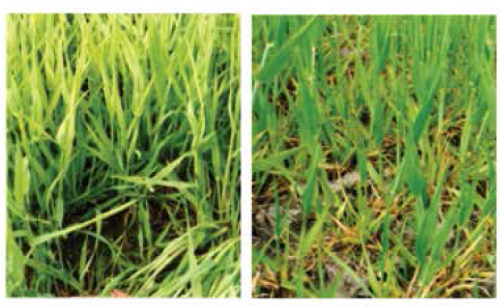
A forgotten nutrient?
A simple way to raise plant yield and improve quality
Sulfur deficiency is a worldwide problem which is gradually growing and negatively affecting yield volume and quality. With sulfur previously supplied almost everywhere through atmospheric deposition before power plant emissions were cleaned up, a replacement source of sulfur is needed. Residual amounts in the soil masked sulfur deficiency for decades. Gradually, though, the effects emerged, especially in crops with high sulfur demand like cereals, oil rapeseed, etc. Not only did yields decline, but protein quality also suffered, leading to poor bread baking quality.
Sulfur shortages also remain unnoticed due to similar deficiency symptoms as for nitrogen deficiency. Farmers often confuse one deficiency with another and try to correct it with additional N applications. This solution obviously doesn’t work, because trials had shown that application of nitrogen fertilizers can become ineffective when sulfur is missing. Thus, the additionally applied nitrogen will not be used and will be lost to the air or groundwater, damaging the environment. Sulfur is an essential driver and structural component of amino acid formation in plants from nitrogen, such as cysteine and methionine. If sufficient sulfur is not available, nitrogen processing of the plant is disturbed. As a general rule, every kilo of sulfur enables 10 kilos of nitrogen to be used fully for growth and yield formation.


Sulfur-containing amino acids, in their turn, are precursors of enzymes and secondary plant products and directly involved in metabolic reactions; they protect cells by detoxifying oxygen radicals and heavy metals; they are also part of the vitamins (thiamin (B1), biotin (H)); coenzymes involved in photosynthesis, fatty acid synthesis and the structural function of proteins. Finally, sulfur is an important component of many taste-giving substances like mustard oils and leek oils.
Today, sulfur fertilization is a must and we must provide a broad range of sulfur-containing fertilizers for farmers to ensure fields keep their nutrient balance